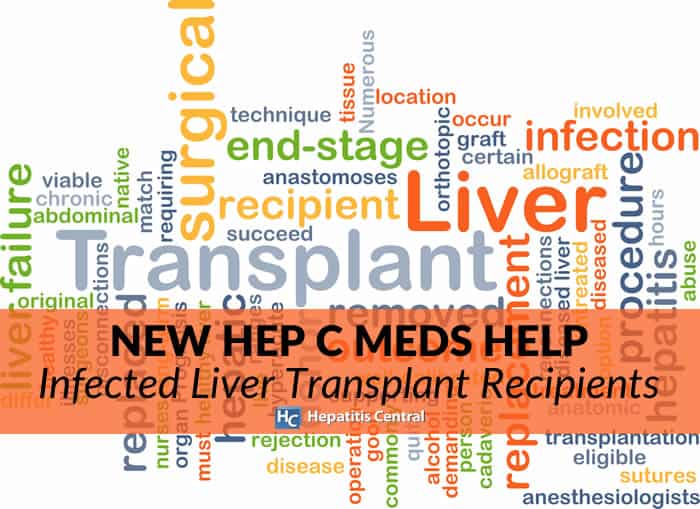New Hep C Meds Help Infected Liver Transplant Recipients


Liver transplant recipients with Hepatitis C have many obstacles to tackle after they receive a new liver. Because the Hepatitis C virus almost always returns after transplantation, one of those obstacles is viral elimination. Getting rid of Hepatitis C post-liver transplant had previously presented a formidable challenge; however, the new direct-acting antiviral medications are much more effective.
Between three and four million Americans are believed to have chronic Hepatitis C, and many surmise this to be a conservative estimate. Hepatitis C viral infections cause approximately 40 percent of all chronic liver disease cases in the United States. If chronic liver disease progresses enough in severity, it can become cirrhosis. Hepatitis C-related cirrhosis is the most frequent indication for liver transplantation in adults. For those who have severe liver damage from an advanced case of Hepatitis C infection, receiving a liver transplant may be their only option for survival.
Liver transplantation is a complicated surgery, requiring lifelong follow-up care. While a liver transplant gives those affected a second chance, it is not a cure for the Hepatitis C virus:
- Although Hepatitis C is a viral infection of the liver, the virus also resides in the bloodstream.
- Infection of the new, transplanted liver occurs nearly universally in patients with untreated Hepatitis C infection.
- Reinfection has been documented to occur as soon as reperfusion of the new liver takes place in the operating room.
- Hepatitis C viral titers have been detected to reach pre-transplantation levels within 72 hours of the transplant surgery.
- The course of liver disease in those with Hepatitis C after a liver transplant is much faster than prior to a liver transplant.
- Among post-transplantation patients with untreated Hepatitis C infection, 10 to 20 percent will develop cirrhosis within 5 years of the transplant.
While treating liver transplant recipients with Hepatitis C right away seems to be the obvious choice, this has been a historically challenging proposition. This is for three primary reasons. The older treatment protocols (including interferon) for Hepatitis C had:
- poor success rates
- frequent adverse side effects
- significant drug-drug interactions
The great news is that the new direct-acting antiviral medications are changing the outlook of liver transplantation with Hepatitis C. As published in a September 2016 edition of the journal Transplant Infectious Disease, researchers investigated the effect of direct-acting antivirals on the enzymatic liver function of liver transplant recipients with recurrent Hepatitis C. They found that antiviral treatment with direct-acting antivirals enabled sustained elimination of recurrent Hepatitis C in liver transplant recipients and was associated with a significant improvement of enzymatic liver function.
The new direct-acting antivirals are making a huge difference in post-transplant success with Hepatitis C, but there are several medication issues to know about. Post-transplant patients (including those with compensated cirrhosis) are advised to avoid the following medications:
- Regimens containing peg-interferon
- Monotherapy with peg-interferon, ribavirin or a direct-acting antiviral
- Regimens using Incivek, Victrelis, or Zepatier
- Post-transplant recipients for those with decompensated cirrhosis are advised to avoid the following medications:
- Regimens containing Incivek, Olysio, Incivek, peg-interferon, Technivie, Victrelis, Viekira Pak, or Zepatier
- Monotherapy with peg-interferon, ribavirin or a direct-acting antiviral
According to the American Association for the Study of Liver Diseases, there are preferred protocols for different presentations of Hepatitis C post-liver transplantation. The protocols differ per genotype, treatment experience and stage of liver cirrhosis. It is clear that the treatment of Hepatitis C in patients who have received a liver transplant is an actively evolving field. Recommendations for deciding on the best course of action may change as new data emerges and new medications are approved.
Hepatitis C that has progressed to cirrhosis may require a liver transplant to improve the odds of survival. Those who have gone down this path before direct-acting antivirals were available had a much lower success rate than today. As supported by the new study described above, antiviral treatment with direct-acting antivirals makes a big impact on virus elimination and improvement of liver function.
http://www.hepatitisc.uw.edu/pdf/special-populations-situations/treatment-post-transplantation/core-concept/all, Treatment of Recurrent HCV Infection following Liver Transplantation, Retrieved September 17, 2016, Hepatitis C Online, 2016.
https://www.hepmag.com/basics/hepatitis-c-basics/transplantation, Complications of Hepatitis C – Liver Transplant, Retrieved September 17, 2016, hepmag.com, 2016.
http://www.ncbi.nlm.nih.gov/pubmed/27632190, The impact of directly acting antivirals on the enzymatic liver function of liver transplant recipients with recurrent hepatitis C, Raschzok, N, et al, Retrieved September 16, 2016, Transplant Infectious Disease, September 2016.







